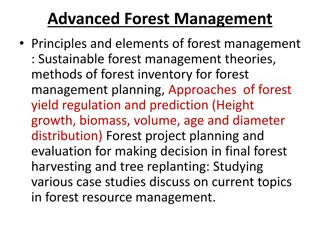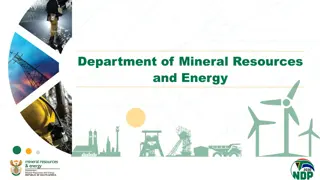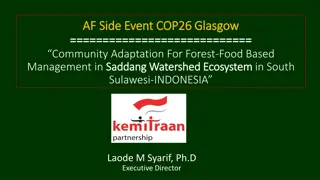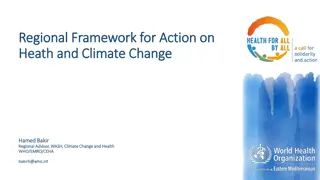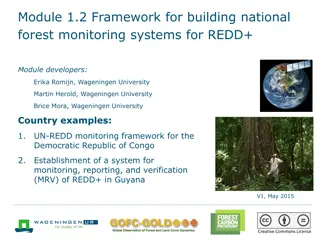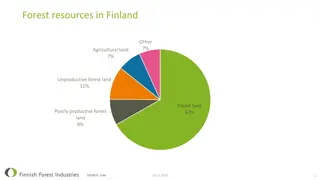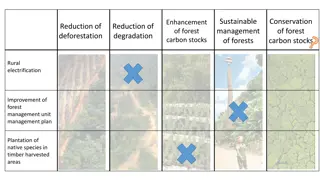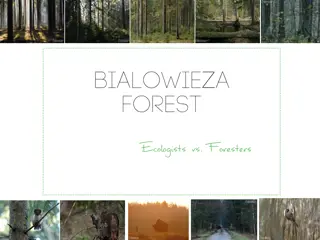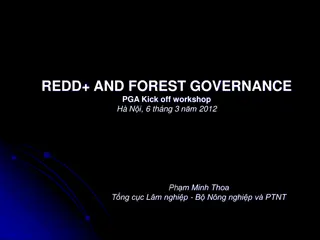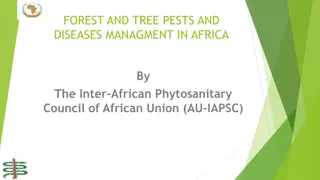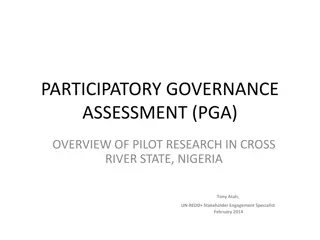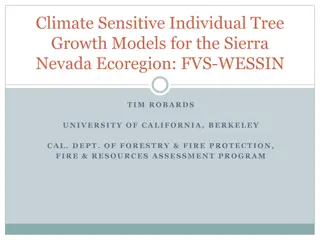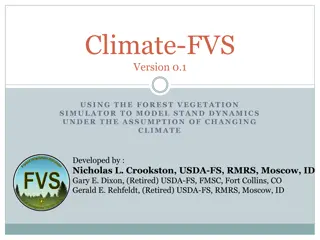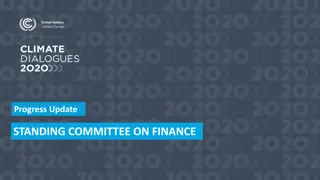Enhancing African National Forest Governance for Climate Agreement Response
The study focuses on enhancing African national forest governance to align with the Paris Agreement and related climate change policies and initiatives. It highlights the importance of forests as GHG sinks and the pressing need for protection and sustainable management. The study aims to generate knowledge to improve coordination and understanding among African forestry stakeholders in the context of International Arrangements on Forests and relevant Sustainable Development Goals.
Download Presentation

Please find below an Image/Link to download the presentation.
The content on the website is provided AS IS for your information and personal use only. It may not be sold, licensed, or shared on other websites without obtaining consent from the author.If you encounter any issues during the download, it is possible that the publisher has removed the file from their server.
You are allowed to download the files provided on this website for personal or commercial use, subject to the condition that they are used lawfully. All files are the property of their respective owners.
The content on the website is provided AS IS for your information and personal use only. It may not be sold, licensed, or shared on other websites without obtaining consent from the author.
E N D
Presentation Transcript
ENHANCEMENT OF AFRICAN NATIONAL FOREST GOVERNANCE TO RESPOND AGREEMENT AND RELATED CHANGE POLICIESAND INITIATIVES TO THE PARIS GLOBAL CLIMATE Presented by FOKABS: Dieudonne Alemagi/Ngwa Elvis Suh 03/08/2024 1
CONTENT Introduction and justification of the study Objectives of the study Methodology and analysis approaches Results on key result areas, discussion, conclusion and recommendations Key messages and policy implications 03/08/2024 2
1. INTRODUCTION AND JUSTIFICATION OF THE STUDY The PA adopted in 2015 during the UNFCCC COP 21 as a legally binding framework to tackle climate change outlines key commitments towards climate change mitigation and adaptation (Streck et al., 2016 and Ecbi, 2018). Member states actions towards the achievement of the Paris Agreement goal are pledged using INDC-NDC approach (individual), and are to communicate progress of the implementation every 5 years (Articles 4.2, 4.8 and 4.9, UNFCCC Paris Agreement) In parallel, world leaders also adopted the 2030 agenda for Sustainable Development with the objective to produce a set of universal goals to meet the urgent environmental, political and economic challenges facing the world. The NDC and the 2030 agenda for SD represent a great potential for synergy and complementarity (Ecbi, 2018). Forest among the main GHG sinks/resevoirs need protection. The PA encourages parties to take actions toward ER from deforestation and forest degradation and the role of conservation and sustainable management of forest carbon sinks (PA article 4.1 &2) which involves Mit & Adapt. The forest sector globally represents the world s most important carbon sink with an estimated 77% of all carbon stored in vegetation and 39% stored in soils (GIZ, 2017). 03/08/2024 3
1. INTRODUCTION CNTD FLULUC contributed to 23% of GHGs from 2007 to 2016 caused by DD in the tropical belt (IPCC, 2014 and Federici et al., 2015) The importance of the forest sector to meet global and national ambitions let to the adoption of the first ever United Nations Strategic Plans for the Forest for 2017-2030 which forged the special session of the UN Forest Forum in January 2017 (UNFF, 2019) mong other initiatives. The forest sector continuously witness increasing conversion to other land uses and degradation (FAO, 2018). Many International Forest Governance and Policy Arrangements (IFGAs) to strengthen the protection and sustainable management of forest presents limiting (Sotirov et al, 2020) Deforestation and forest degradation tends continue to increase and the global community is far from attaining agreed sustainable development targets (Pokorny et al, 2019) Fig.1 most African countries with significant forest density experience increasing pressure on forest and forest related resources (Buce et al., 2018), The study thus, generates knowledge that could enable African forestry stakeholders to have better understanding and coordination on their national forestry sectors in the context of the International Arrangements on Forests (IAF) and relevant SDGs. 03/08/2024 4
Fig1. 24 deforestation fronts globally 03/08/2024 5 Sources: WWF (2021), WRI (2020)
2. OBJECTIVES OF THE STUDY The overall objective of this study was to undertake an in-depth study that could provide information to enhance national forest governance to respond to the Paris Agreement (PA) and related global climate change policies and initiatives in countries in Central and West Africa. Specifically, this study sought to: Assess forest governance in the selected case study countries to help forest stakeholders respond to the PA and related global climate change policies and initiatives; and Assess national forest sector contribution to NDCs in the selected case study countries. 03/08/2024 6
3. METHODOLOGY AND ANALYSIS APPROACHES The methodological approach used for this study was based on the following Desk Study: literature review (secondary data), data collection tools development, elaboration of methodology Data collection: The data collection tool was designed to collect information on response to Paris Agreement and related climate policies and initiatives on national forest sector contribution to NDC Field study: Field data collection from 8 countries in West and Central Africa based on a target specific sampling approach. 03/08/2024 7
3. METHODOLOGY AND ANALYSIS APPROACHES This involved Face-face interview, group discussions, interviews through emails etc. Target audience included civil society (national and international NGOs), relevant government officials, donor agencies, research institutions and the private sector. Data analysis and reporting. The data collected was cleaned was subjected to simple descriptive statistical analysis using SPSS Version 24.0 and MS Excel 2010. Graphs and tables were generated and used to develop the key deliverables. This study covered the Central and West African regions, specifically, Central Africa: Cameroon, Democratic Republic of Congo, and Republic of Congo and West Africa: Mali, Gambia, Benin, and Liberia The choice of country was based on the presence of forest policy reforms, ratification of the Paris Agreement, and deforestation 03/08/2024 8
4-1. RESULTS ON KEY RESULT AREAS A. ON RESPONSE TO PARIS AGREEMENT AND RELATED GLOBAL CLIMATE CHANGE POLICIES AND INITIATIVES To assessment of Forest governance, components were generated from the 6 principles of good forest governance (transparency, accountability, participation, coordination, efficiency and capacity) to assess the level of application in the sampled countries. 120 Strongly disagree Partly disagree Neither agree nor disagree Partly agree Strongly agree 120 Strongly disagree Partly disagree Neither agree nor disagree Partly agree Strongly agree 100 100 10 15 25 13 80 31 33 23 25 38 Percentage (%) 80 Percentage (%) 35 31 40 38 60 60 29 27 35 27 19 31 40 35 40 40 17 17 17 8 19 15 15 10 15 20 15 20 19 19 8 10 13 15 15 15 21 13 8 8 13 4 0 10 10 6 4 2 0 Opportunities for public participation Support for transparency and accountability Effective and independent government oversight mechanisms Adequacy in local capacity Clarity and coherence Recognition and protection Recognition of customary and traditional rights Concordance of broad dev. policies Clear and mutual forest- related mandates Provisions and mechanisms for equity sharing Component Component Figure 2: Clarity and coherence in policy, legal, institutional, and regulatory frameworks in Central and West Africa 03/08/2024 Figure 3: Transparency, accountability, and inclusiveness regarding forest policy implementation in West and Central Africa 9
Forestry initiatives and climate change related policies in Central and West African countries Strongly disagree Partly disagree Neither agree nor disagree Partly agree Strongly agree 120 100 8 8 10 27 23 Percentage (%) 80 27 35 33 60 38 17 40 17 40 31 21 8 17 19 20 15 15 13 23 17 8 6 6 0 Effective administrative system Effective measure and tools for law enforcement Measures and Mechanisms for land tenure and property right administration effective coorperationa nd oordination between national and subnatioanal government Adequate and effective measures to address corruption Component Figure 4: Effectiveness, efficiency and equitability in the implementation of forest policies, legal and regulatory frameworks in West and Central Africa Figure 5: Barriers in the implementation of forest and climate initiatives in west and central African countries Areas of overlap and synergy in the national forestry sector in response to global and regional climate change related policies and initiatives Although considerable efforts on the ground, there is still need for efforts to be visibly strengthened through integrated approaches Most forest related policy document pay little attention to climate change Climate change is not captured in forest subsector policies 03/08/2024 10
Figure 7: The main challenges in mainstreaming regional and global frameworks into national policies and local program Figure 6: Knowledge and skills on mainstreaming global and regional climate change policies and initiatives into national forestry policies in Central and West Africa Mechanisms used for stakeholder consultation, participation, implementation, and monitoring of forest policies Mechanism for stakeholder consultation Mechanism for stakeholder participation Mechanism for stakeholder implementation Mechanism for stakeholder monitoring 03/08/2024 11
Capacity gaps on reporting forest-based plans and activities that relate to SDGs and NDCs at national, regional and international level Figure 8: Limitations in integrating global initiatives into forest sector in West and Central Africa. Factors dissemination of forest related initiatives related to SDG and NDC include: limiting effective communication and weak implementation of policies. limited data availability. limited human and financial capacities poor awareness on SDG. poor synergy among key stakeholders. 03/08/2024 - - - Figure 9: Channels for reporting forest based and climate change information at national and international level. - 12
B. NATIONAL FOREST SECTOR CONTRIBUTIONS TO NDC An assessment of the contribution of the forest sector to NDC of targeted countries Benin, Mali,, Senegal and Rwanda Figure 10: Consideration of forest related initiatives in NDCs of central and west African countries Figure 11: The Evolution of INDC in west and central Africa Study countries demonstrated a good understanding of REDD+,-REDD+ Strategy, except for Gambia and Mali. Some of the countries captured REDD+ in their NDC. Forest related NDC initiatives included: afforestation initiatives, biomass energy, agroforestry programs, forest conservation and protection to reduce deforestation and forest degradation. Contribution focused on enhancing stakeholders inclusiveness, carbon stock accumulation and reduction of GHG emissions and capacity building 03/08/2024 13
4-2. DISCUSSION Governance incorporates the rules adopted to organize and manage activities to serve larger social objectives and solve conflicts between stakeholder groups, the functioning of institutions and their acceptance by the public, and the broader efficacy of government (Laird et al, 2010). Common Barriers in implementing forest related initiatives and CC could be attributed to the fact that institutions and organizations in West and Central Africa are not equipped with adequate technical and human resources for the implementation of forestry initiatives (Minang et al. 2008; Dkamela, 2010). Angelsen et al. (2009) explains that , only 3% of tropical developing countries have very good resources for mainstreaming REDD+ into national policy, to support that limited understanding and limited financial means as main challenges in mainstreaming regional and global frameworks the extremely long period it takes to properly integrate initiatives like REDD+ into the forest sector initiatives (Alemagi et al. 2014) further confirms the limitation of forest stakeholders. Limited technical and financial capacity are some of the challenges faced by countries in Africa relating to integrating forest initiatives into NDC is concerned (AfDB, 2018), Challenges associated with climate finance accessibility and how climate finance is defined, will exacerbate if rigor in terms of costing, methodology, financing options and the implementation of national SD is not capture in NDC of African countries (AfDB 2019 report) 03/08/2024 14
4-3. CONCLUSION AND RECOMMENDATIONS The study results reveal that while forest governance in general was partly good in these countries the issue might occur at operational decision-making levels where there is inadequate coordination. Common barriers to effective implementation of forestry initiatives and climate change related policies and main challenges in mainstreaming regional and global frameworks into national policies and local program were identified. Limitations to communication and media reporting forest and climate change-based initiatives were identified. In addition, it was found that countries have made lots of efforts towards building capacity and awareness raising in the forest sector, however, these countries listed several challenges encountered in building this capacity and awareness Therefore to overcoming challenges identified in this study amongst other thing proper knowledge transfer, investment in human and financial resources, proper capacity building, education and sensitization, the need for political will, the need for REDD+ Readiness in Gambia and Mali, and synergistic actions within relevant government institutions. 03/08/2024 15
5. KEY MESSAGES AND POLICY IMPLICATIONS Good forest governance is often associated with accountability, effectiveness, efficiency, equity, inclusion and transparency to achieve positive social, environmental and economic outcomes in the most efficient and effective way which corroborates with the transparency and accountability mechanisms of the PA From the study, while forest governance generally was partly good in the study countries, issues might occur at operational decision-making levels where there is inadequate coordination. Deforestation rate keeps appreciating and forest degradation remain extremely high results partly from limited capacity of African countries to mainstream forest and climate change initiatives into national policies. 03/08/2024 16
5. KEY MESSAGES AND POLICY IMPLICATIONS Poor coordination between the different institutions responsible for advancing good governance in the forestry sector Most forest related policies pay little attention to climate change Government efforts in formulating laws and policies to address some of these issues are well appreciated. However, some of these policies and laws are outdated and implementation is poor. Therefore, there is the need for forestry law reforms. This study provides key information for policy makers who are driving good governance in the forestry sector and other forest related climate change initiatives in the case study countries in West and Central Africa to craft and implement policies, plans, and programs directed at promoting good forest governance and other forest related climate change initiatives. 03/08/2024 17
THANK YOU FOR YOUR KIND ATTENTION 03/08/2024 18


